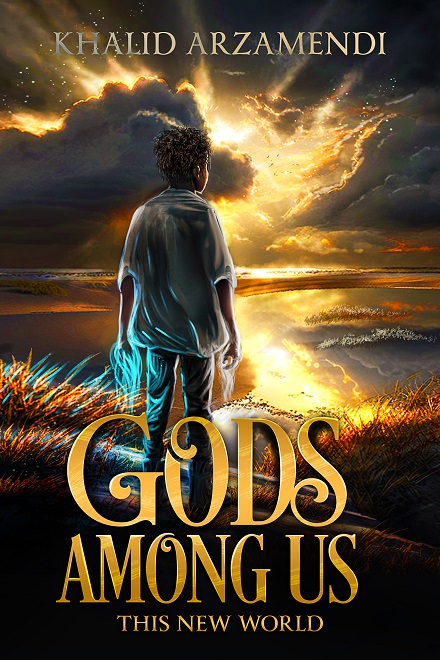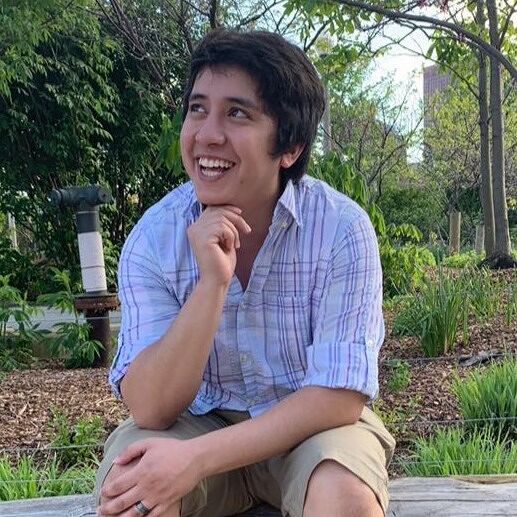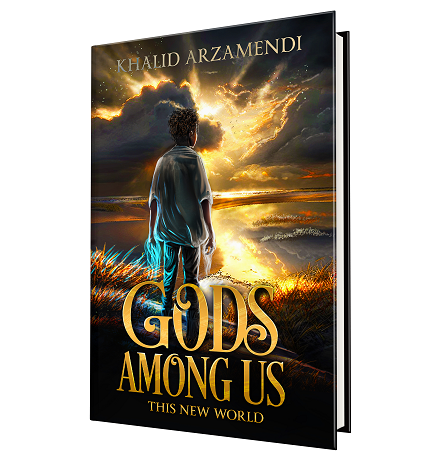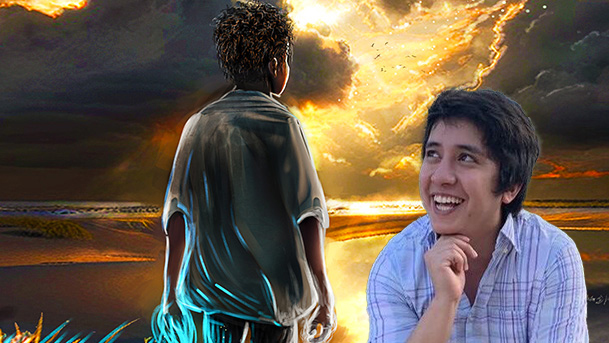Welcome, travelers, to another Tellest interview with a talented author from the Otherworld. Today, we’re going to be talking to Khalid Arzamendi, the author of the book This New World, his debut, and a part of his Gods Among Us series. In our interview today, we’ll learn more about how Gods Among Us came to be, what Arzamendi’s writing process looks like, and what might be next on the agenda. Read on to learn more about this incredible storyteller!
Tellest: Greetings, Khalid! It is an honor to be able to speak to you about your book and your writing journey. Just about all of the writers that I learn about lead incredibly busy lives, and I’m sure you’re no different, so let me just say thank you for sharing some of your time. Your new book, This New World, the first book in your Gods Among Us series, has just recently released, so we’ll jump into discussion on that in just a moment. I’m looking forward to helping to introduce you and your work to a growing audience!
Khalid Arzamendi: Thank you and I appreciate all of your help!
T: I typically begin my interview process by taking things as far back as I can on the author’s writing journey. That usually begins with a favorite author or story that helped to inform a love of fantasy or writing. Did you have someone or something that inspired you, either to enjoy the genre, or to tackle your own stories?
KA: I was actually inspired by the amazing Stan Lee! In 2018, when the film Venom was released in theaters, my friend and I were discussing the movie and how Stan created so many unique, fun characters and stories. I told my friend, “I would love to create stories like him, that would be the dream.” She responded, “Well, Stan Lee was just an average guy. Never came from a wealthy family. If he can do it, you can do it too.” Simply those words, made me realize what I really wanted to do. It all led me to begin my Gods Among Us series.
T: There are a lot of people who would see Stan Lee as an inspiration, for sure! And there are few people worthy of such praise.
A big part of what made Stan Lee successful was his collaborative nature with many other people. In your future, whether it has to do with your Gods Among Us series or something else, can you see yourself expanding to bring in writers, artists, or narrators to help bring your world to life, and make it even more immersive?
KA: I don’t see why not! I would love to work with someone and be thinking on the same wavelength. I am definitely open to it.

T: That collaboration doesn’t necessarily have to be with another storyteller either. When advancing a new fantasy world, there are plenty of directions that you could go. If you had to focus on one area for collaboration, whether it was with another writer to help flesh out the stories in your world, an artist to help you bring your characters to life, or a narrator who gave voices to those that were up until then only on a page, what do you think you would aim for first? Who knows? It might not even have been any of the examples I gave!
KA: I would personally aim for an artist! Especially when events in the story have heavy detail, I would love to see someone bring the story more to life visually.
T: Gods Among Us is your first foray into literary fiction, but it has a lot of polish to it. How long have you been crafting your story, and how did you know that the time was right to send your book out into the world?
KA: I began writing this book near the end of 2018. Though it isn’t a long story, the obstacles I had to go through along the way had helped me improve the story, so I am actually glad that it took almost 5 whole years to complete it. It was the best time to release the book to the world now because I felt that I waited way too long. It was either now or never.
T: Many people have the dream of writing a book, but few ever write their first words, and fewer still complete the tale. What kind of feelings did you have as you were nearing the final words of your first book?
KA: The honest truth is that I did feel somewhat accomplished, but I knew the job wasn’t over. There is always a countless amount of editing that bury the last few words in your book. There’s so much that goes into it that I had to be humble even after publishing the book.
T: As a writer, there is a certain need to toe the line between humility and confidence. You don’t want to oversell yourself, but you certainly have to help get the word out. Sometimes it can be a difficult dance. How do you navigate your pride in your accomplishment, while working not to appear to be a braggart about something so rewarding as completing a story such as this?
KA: I’ve been humbled so many times in life that it’s just me going off on my instincts. Nonetheless, I am very proud that I can call myself an author, and I love my book! After all, this is my first time going through all of this, so I just want to make I did everything right before I celebrate too early.
T: Worldbuilding of any sort can be difficult, but you also take parts of the real world and blend it with a concept of where we might be in two hundred years. Did you have to research a tremendous amount to keep your fantasy somewhat grounded in reality, or was the plan to let the story tell itself with or without a focus on real-life landmarks? In another sense, was it easier to make a new mythology out of your new world, or did having a foundation to lean on provide some relief?
KA: World building is definitely difficult, but my foundation is modern issues that our world faces and has faced since maybe the dawn of time, such as discrimination, war, poverty, etc. Having that as my foundation and adding the imagination stored up in my mind, I was able to create an inevitable future if those problems are never dealt with.
T: While there is certainly a sense of existential dread when it comes to how far we’ve fallen, as expressed in parts of your book, you also balance what you have with moments of light and levity. How did you decide how to strike that balance, and what sort of challenges did you experience in making sure that it didn’t teeter in one direction or the other?
KA: In life, nothing always stays levity and happy, and nothing always stays dark and sad. It’s the brutal truth, and that is what I wanted to convey into the story and allow the emotions to occur naturally, even if it’s painful and/or lifechanging to the characters.
T: There is also a sort of black and white spectrum when it comes to the content of someone’s character. Nobody is born good or evil, but formative events help to steer them in one direction or another. Even your younger characters have different shades apparent in their personality. How did you determine what everyone’s capacity for light or darkness was?
KA: It’s actually more complex than one would think. Two people can go through the same or similar experiences, but both have different thresholds of resistance to pain, sadness, and happiness. No one is 100% the same which leads to a near infinite amount of outcomes that steers a character towards a light or dark path. To determine the right amount of light or dark, I had to build a strong connection to that character and to feel it out carefully. There’s more to just saying, “This character will just be pure evil!” It is deeper than that.

T: While Gods Among Us tells a tale that would be sufficient enough to wrap up the story in a single volume, you’ve also left yourself enough room to write a sequel. Those words, “To be continued”, prepare readers for more fun and excitement to come. How early in your process did you know that your world still needed you, and how much did you already know about where you were going?
KA: Since I started jotting down ideas and building the world in the beginning, I already knew that not even three books are enough to tell the entire story of the future that I foresee, but I do know where I want the story to head.
T: With that in mind—an ending on the horizon—is that your sole focus, or do you sometimes find yourself distracted by the potential to tell other stories in the tapestry of your world? Do you meet the new characters that you’ve written, and feel a pull to their origins, or new stories you could tell with them at the forefront?
KA: New ideas constantly pop up as I continue writing the story! It makes it so fun. It does tempt me to write different side stories of each unique character or about a different part of the world, but honestly, I think that is the most fun part of the process. This just proves that nothing ever goes as planned.
T: Have you ever been so surprised by what a character did, or an event that unfolded, that you had to veer off in a completely different direction? Or have you more often than not had to steer the cart back onto the road, so to speak?
KA: Of course! And it happens more as I keep working on this series! Even as the author, I never know what to really expect!
T: Writing a book is a tremendous feat, but it is not without its challenges, either during the writing process, or once it’s been completed, and you need to begin considering marketing plans. What do you think is the most challenging thing that you’ve had to face when bringing Gods Among Us to the world?
KA: The hardest challenge when creating Gods Among Us was finding the energy to write. To me, writing with an exhausted mind led to poor results. Many times through these several years, my brain would be beyond drained, but pushing my limits was the real challenge, and now I am here with my first completed book. It was quite the challenge for me.
T: With that in mind, do you learn any sort of mental exercises that you were able to perform to help energize your mind in one way or another? Was it an issue of fighting past physical fatigue to unleash your mind, or was it more a mental drain?
KA: Meditating and just simply just laying down and resting is all you can really do. Relieve as much mental fatigue and stress. Coffee and energy drinks weren’t doing it for me. Those things only made my heart pump faster, but my mind was still restless. Physical fatigue from my day-to-day job played a role too. Simple rest was my only medicine, but everyone has their own remedies to recover their own fatigue.
T: Every journey is different, even though every story has to begin with the first word. What was something that you learned along the way that you believe might be of some value to other storytellers who would want to follow in your footsteps? What advice would you give to someone who was just starting out?
KA: The one weird thing I did to begin writing was close my eyes, place my fingers on the keyboard (luckily, I learned how to type without looking in high school—write on a notebook if you can’t), and allow the creative ideas I kept bottled inside flow freely onto document. It’s strange advice, but hey, it worked for me! And something I learned along the way was to take your time to understand your own writing and story because great ideas can sound simple when you write it down sometimes. So, take your time and don’t rush your art!
T: In a lot of ways, the story that you unleashed in This New World feels very thoughtful and expressive. How did you manage to bridge the gap between an almost stream-of-conscious workflow and the end result that you present in your novel?
KA: Basically, after putting down all of my ideas, I then had to pick and choose in what order do I want these events to happen. There were a good amount of rough drafts and omitted sections. This is my first book ever written, so it wasn’t the most pretty, well-written story at first. That’s why it is important to take your time with your craft, to have the cleanest version of your story.

T: With the next book on the horizon, is it easier to speculate what the storyline is going to be? Since you don’t have as much of a fresh start, is it less of a challenge to find your focus?
KA: Yes, the path of the Gods Among Us is set with its wild obstacles. It must now go down this path!
T: As with all fantasy storytellers, there helps to have a bit of mystery. But if someone wanted to learn more about your newly fashioned world, or you and your writing process, where could they go to discover more about you?
KA: Hmm, I don’t have a twitter or an Instagram that’s based around my book or me haha. People can always follow or friend me on Facebook or follow my author profile on Amazon.
T: Have you considered building a website that would have a newsletter that you could send to your fans? With as big as your world has the potential to grow to, you might have a lot that you could say on the matter!
KA: I have been considering it more and more each day, but I have to take it one step at a time and focus on the next story first. The time will definitely come when I will decide to do that.
T: Khalid, I wanted to thank you very much for spending some time with me, discussing your story, and your world. I feel very lucky that I was able to discuss the various parts of how your project came to be, and to learn what is coming up next for you. It will be a pleasure to help more people discover you and learn about This New World!
KA: Thank you! It was fun sharing with you, and I really appreciate your help! Hope everyone enjoys reading Gods Among Us: This New World!
Once again, I’d like to thank Khalid Arzamendi for joining us to talk about his new literary world, and the stories that are coming out of it. It’s always a joy to talk with a talespinner who is excited about their work, and to see Arzamendi at the start of it has been a tremendous opportunity. If you’d like to see his work for yourself, check out Gods Among Us: This New World on Amazon today!
Michael DeAngelo
Latest posts by Michael DeAngelo (see all)
- Fantasy Promo – Quinine - July 25, 2024
- Sigil Art – Grim’s Hold - July 24, 2024
- Fantasy Promo – Light the Shadows (Under Elfhame’s Stars) - July 24, 2024
